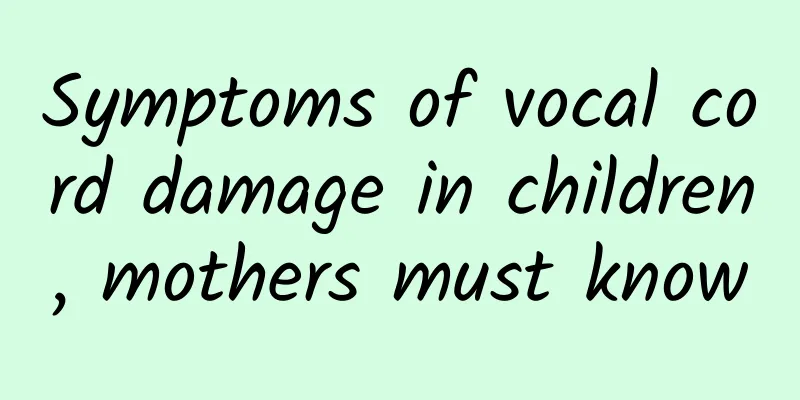Symptoms of vocal cord damage in children, mothers must know

|
Children are most naughty when they are 7 or 8 years old. Many children like to shout and act crazy and noisy at this time. And often the more their parents forbid them to do so for fear that it will affect the development of their vocal cords, the more they like to do so, which makes countless parents and friends depressed. Therefore, only if mothers understand the symptoms of voice damage in children can they detect abnormalities in their children's vocal cords in time and provide timely treatment. In fact, difficulty in pronunciation and speaking, hoarseness or only being able to make short and hoarse sounds all indicate that the child's vocal cords have been damaged. Differential diagnosis of vocal cord injury in children: 1. Paralysis of vocal cord ) or laryngeal paralysis is a clinical manifestation rather than an independent disease. When the motor nerve of the larynx (recurrent laryngeal nerve) is damaged, three types of paralysis may occur: vocal cord abduction, adduction, or relaxation. Clinically, left vocal cord paralysis is more common because the left recurrent laryngeal nerve has a longer course. 2. Glottal dyskinesia: Glottal dyskinesia is an abnormality of glottal movement function caused by various causes, and is a type of disease with pronunciation disorders as the main clinical manifestation. It can be divided into neurological, muscular, articular and functional. 3. Hoarseness : Hoarseness, or hoarseness, refers to the loss of round and clear sound quality when speaking. Clinically, there are varying degrees of changes in sound quality. The lightest is called "hairy", which means that there is a certain degree of change in sound quality when producing high notes, and the sound becomes rough. "Sandy" refers to a change in the tonal quality of almost all notes. Moderate changes in sound quality are called "hissing". At this time, in addition to the sound quality becoming rough and impure, there is also air leakage, indicating that there is an obvious gap between the bilateral vocal cords when pronouncing. Severe changes in voice quality are called "homophonia", which means that the glottal gap is very large when speaking, the vocal cords cannot vibrate, and only whispers can be made. 1. Remind your children not to shout at the top of their voices. You should raise your hand to speak in class. No matter whether others are right or wrong, express your opinion after listening. Don't shout to interrupt others. This can not only protect the vocal cords, but also cultivate good manners. 2. Don’t let children talk for a long time. Take a break and drink some water after each speech. Try to speak as little as possible in an environment with noisy background sounds so that your child doesn't have to shout at the top of his lungs to be heard by others. After talking for a long time, it is not suitable to eat cold drinks or drink cold boiled water immediately. Eat less spicy and irritating food, especially during the voice change period of children, so as to avoid local irritation of the child's vocal cord mucosa. When your child has a cold or cough, try to let him speak less to reduce the congestion and edema of the vocal cords caused by the illness. 3. Choose songs suitable for children to sing. Some children like to choose "roaring" songs when singing, thinking that the louder the better. This can easily cause vocal cord damage. |
>>: What causes sudden deafness and tinnitus? Can it be treated?
Recommend
What should I do if I haven't had my period for two months?
Although menstruation is a very troublesome thing...
The effect of drinking Sophora flavescens soaked in water
Sophora flavescens is a very common medicinal mat...
Quick acne treatment method
The pace of life for modern people is getting fas...
Do you know what causes excessive sweating?
Everyone will experience sweating, because when t...
What are the white particles squeezed out of acne?
Almost all of us have been troubled by acne, espe...
How to prevent chronic pharyngitis? How to recuperate?
Although chronic pharyngitis is not a serious dis...
What is the relationship between stiff neck and cervical spondylosis
Many people do not have a special understanding o...
Will taking Chinese medicine make you fatter?
Chinese herbal medicine is a very good way to tre...
From the perspective of traditional Chinese medicine, where is your fire?
It is very easy to get angry in the summer, but t...
What should I do if I suffer from sciatica during the confinement period?
You may encounter many situations during the conf...
Why are the follicles getting smaller?
It is very easy for a normal woman to get pregnan...
How to prevent recurrence of chocolate cyst after surgery
Chocolate cysts in women are a relatively common ...
Do tranquilizers have any effect on babies?
It is very important for a woman to take care of ...
How to prevent tooth decay
What we often call tooth decay is medically known...
Symptoms of manganese deficiency
Manganese is a relatively common trace element an...









